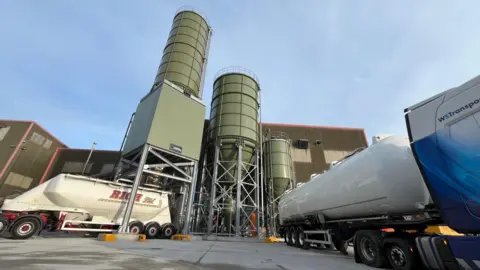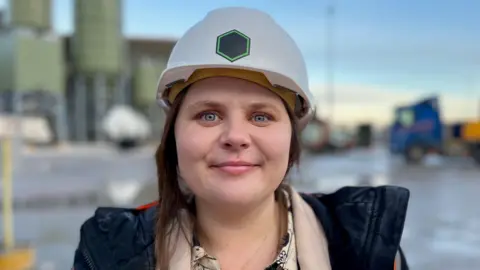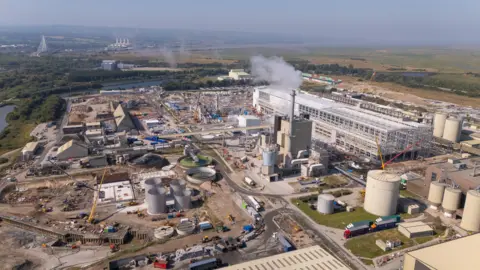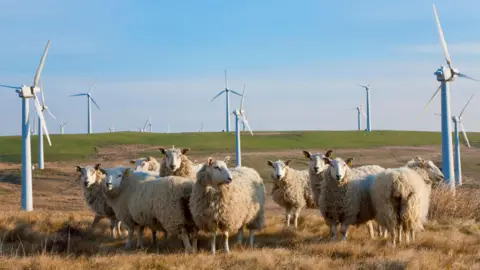Can north Wales become a green hub of Europe?
 BBC
BBCA low-carbon cement firm could be a step on the way to north Wales becoming the "green hub of Europe," its boss has claimed.
Material Evolution produces cement at its Wrexham base that it claims has 85% fewer emissions than many traditional products.
Co-founder Dr Liz Gilligan said the location and area's industrial heritage made it the perfect place "for the industries of the future to be built from the knowledge of the past".
Some experts agree north Wales has the potential to become a big player in decarbonisation, but vast investment and a faster planning process would be needed.
Cement binds the sand and aggregate in concrete together and concrete is the world's most widely used material after water.
It is also a major driver of climate change.
Limestone is heated to 1,600C (2,900F), often in giant kilns powered by fossil fuels, driving out carbon dioxide.
It is estimated every tonne of cement produces an equal amount of carbon dioxide, but Material Evolution says its ultra-low carbon cement, MevoCem, uses no heat.
It uses a process called alkali fusion, which it said uses chemical reactions to activate waste materials without heat.
The plant, in Llay, aims to produce 120,000 tonnes of low-carbon cement per year.

Dr Gilligan added: "For me, the really exciting thing about north Wales is its industrial past, the exciting heavy industries that have always been there.
"And I think that comes with a culture of understanding technologies, how you scale industry. I really do believe that north Wales can become the green hub of Europe.
"I think it has the resources, I think it has the local talent and knowledge and I think it's well located for different distribution across the UK. I think this makes it the perfect heartland for these new industries."
It is a bold claim, can north Wales – much of which is renowned for its industrial past - really help shape a greener future?

One expert believes so, but says a great deal needs to change first to attract investment.
Dr David Sprake, programme leader for carbon courses at Wrexham University, said: "I think we need a slicker planning system and also funding opportunities to make that happen."
Those are huge caveats.
The UK government's net zero target by 2050 will require huge investment and large renewable energy projects can take years to gain approval, often facing opposition.
There is also concern massive investment is needed to boost grid capacity, particularly in rural areas, or at sea where production of renewable energy is a long way from where it connects to the network.
But there is evidence companies want to invest across north Wales.
 Eren Holding
Eren HoldingThe UK government has approved plans for the Awel Y Mor offshore wind farm, which its developer said could power 500,000 homes.
Cement giant Heidelberg wants a £400m carbon capture facility in Flintshire which it hopes will pipe 800,000 tonnes of carbon dioxide a year to be stored under the sea bed.
Turkish firm Eren Holding is transforming the old Shotton Mill in Flintshire into a £1bn cardboard and tissue production facility.
On Anglesey, Lightsource BP's Mean Hir project would be the size of 1,700 football pitches if approved but it is highly controversial and opponents have vowed to fight it.
 Getty Images
Getty ImagesThe green economy is not just about new technology though.
Ashley Rogers, CEO of the North Wales Business Council, agrees the area has "excellent potential to be a leading green hub" but said protecting thousands of existing jobs and decarbonising current industries was also crucial.
"Exports of goods from Flintshire and Wrexham alone are well over £5bn a year. We punch way above our weight on a global scale," he added.
Not-for-profit body Net Zero Industry Wales aims to help businesses deliver net zero targets.
Its CEO Ben Burggraaf said north Wales had "a strong industrial foundation" in energy production, gas processing and steel production, making it "well placed to take a leading role in the UK energy transition".
The Welsh government said its North Wales Growth Deal and a freeport on Anglesey formed part of a "growth strategy... aiming to attract over £3.4bn in investment".
It said these initiatives focused on "sectors such as digital connectivity, advanced manufacturing, green energy and infrastructure development" and were aimed at delivering "a vibrant, sustainable and resilient future for north Wales".
